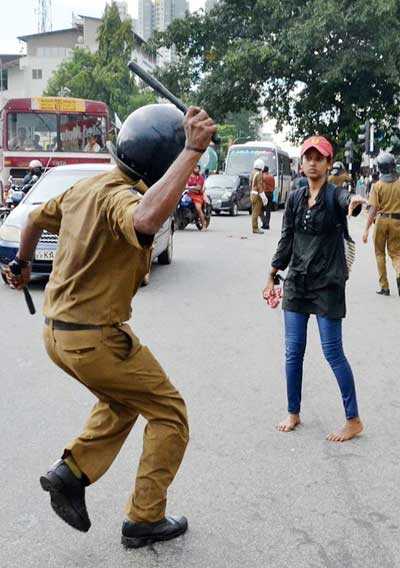Thursday Feb 19, 2026
Thursday Feb 19, 2026
Wednesday, 6 July 2016 00:08 - - {{hitsCtrl.values.hits}}

These are days of fading hope and overwhelming despair for those who toiled hard for the ‘Yahapalanaya’ [good governance] which Mahinda loyalists now call a ‘Jadapalanaya’ [rascally governance] and the disenchanted call ‘Gong Palanaya’ [bovine governance]
Opinions are tentative conclusions open to dispute. It is my opinion that the Auditor General reports his findings, detections and discoveries to parliament. It is therefore my opinion that the honourable Minister is in grave error. That said here are some informed opinions.
 When University Dons prominently associated with the ‘Movement for a Just Society’ pass by, it has become routine for students in the Colombo campus to simulate coughing. Their wicked fun draws inspiration from the Sinhala expression ‘Kahinawa’ – a derisive term that infers a futile advocacy of lost causes.
When University Dons prominently associated with the ‘Movement for a Just Society’ pass by, it has become routine for students in the Colombo campus to simulate coughing. Their wicked fun draws inspiration from the Sinhala expression ‘Kahinawa’ – a derisive term that infers a futile advocacy of lost causes.
These are days of fading hope and overwhelming despair for those who toiled hard for the ‘Yahapalanaya’ [good governance] which Mahinda loyalists now call a ‘Jadapalanaya’ [rascally governance] and the disenchanted call ‘Gong Palanaya’ [bovine governance].
For a vast majority who voted for change on 8 January 2015 it mostly stirs a brutal sense of déjà vu. When stripped of its French sophistry, it means they have ‘already seen’ it so many times before. The term is unavoidable because déjà vu conveys the painful blurring of lines between promise and aborted delivery, between dreams and reality.
On 5 January 2015 I wrote in the columns of the Daily FT that politics was essentially a fluid process. I said ‘new issues, new personalities create new circumstances. ‘Politicians’ I said who accurately and dispassionately read the patterns of evolving circumstances can fame strategies that fit the new landscape. I explained that the Maithripala Sirisena candidacy was the result of such intuitive reading of public discontent by political leaders determined to topple the incumbent. I also emphasised that the then Opposition was at war with itself and the incumbent was anesthetised by its own absolutism.
My opinions were expressed three days before liberation day. In those days, I did not contribute to web journals. I did not know how to. I wasn’t sufficiently savvy with proxy servers to access websites that were not in the good books of ‘Gota’ who won the ‘war. It was particularly scary because he was in a serious battle to draw blinds at high noon.
This digression was necessary, lest a condemnation of the present be construed as a plea for a return to insanity and the populist tribal state.
Central Bank succession
At the last presidential elections, citizens had a simple menu of choices. The Tamils and Muslims decided between digestion and dyspepsia. A sizeable but a less than impressive minority of the majority Sinhala voters were exasperated with the monotony of incumbency. It was no revolution of the type of great October uprising in St. Petersburg as claimed in a chronicle of events of 8 January 2015 by one of the recent aspirants for the top job in the Central Bank.
That there was a clear divergence of opinion between the President and Prime Minister in resolving the succession at the Central Bank is no secret. The standoff between the common candidate and the UNP Leader has exposed the fragile nature of the alliance between civil society that hoped for a transformational change and the political class whose priority was the electoral defeat of the incumbent President. To the pragmatists in the UNP, the ‘Just Society’ was just another slogan coined by an inconvenient priest who offered a convenient path to bell the cat and conveniently passed away in to the mist of memories of the anguished, oppressed and the distressed.
What civil society activists did not know then and know now, is that in representative democracies, coordinating responses of voters to a specific political choice remains the exclusive domain of political parties.
Elections are won or lost through competition among political parties no matter which sage or savant preaches in the amphitheatre of public opinion. Political parties draw strength not from pious declarations but from incentives to their core members whose prize is the control of government. It is they who form strategic alliances with interest groups and then set the post elections agenda.
For Mahinda Rajapaksa, disadvantages of incumbency after two terms in office outweighed his contempt for accountability in electioneering. One of these, it may be found that distribution of ‘Sil Redi’ is a perfectly reasonable act for the State that is constitutionally obliged to protect and foster the Buddha Sasana. The exasperation with the political class negatively impacts the party in office. The pervasive voter discontent also affects the party in power. Now the shoe is on the other foot.
It is a sobering reminder for all well-meaning but naïve do-gooders, your truly included.
This writer remains convinced that the trajectory of the Sirisena presidency was framed in the early hours of 8 January 2015 when the anointed agreed to renounce the crown. The Political Correspondent of the leading Sunday English broadsheet makes a cryptic one line disclosure on Sunday 3 July – “Strange but true, even some very noteworthy players in the Opposition including a former VVIP, were privately supporting Mahendran’s continuation in office.”
What happened in the bond fiasco was that information continued to flow for the sake of information. Messages were exchanged to mobilise public opinion. It is the first tangible demonstration in this country that technology has substantially swelled the ranks of citizen journalists and whistle-blowers in high places.
The unprecedented public scrutiny of and engagement with the Central Bank’s handling of the bond controversy holds lessons for the ruling oligarchy that has replaced previous oligarchs who unlike the present lot, operated quietly in the shadows. The perceived pitiless repression of their patrons kept agitation off the streets and controversy off the front pages and evening television.
Politics and opinions
Today we have a Government that has reneged on some promises and delivered on some. Due mainly to their blind allegiance to liberal free market economics camouflaged clumsily in meaningless assertions of a social market economy, they have removed the lid on public discourse and politics of protest. Social media have flattened hierarchies and removed barriers in communication. The vibrant engagement in social media provide citizens with unlimited information on any specific issue.
The alleged extracts from the report of the Auditor General prompted the Leader of the House and the new keeper of the conscience of the UNP to declare that the Auditor General has only expressed an opinion. With deliberate panache, the noble manor born politician from the hill country told the press that Arjuna Mahendran was innocent because in none of the cases filed against him had he been found guilty. He said Mahendran was educated at Oxford and Harvard Universities. He is a person with international contacts. He knows what international trade is. He is a big asset and he construed the refusal by the Supreme Court to grant leave to proceed on the fundamental rights application by three civil society activists as an exoneration by the apex court. Then came the immortal pronouncement: “The Auditor General’s report was only an opinion.”
Politicians are entitled to their opinions. We citizens are entitled to informed opinions precisely because the purpose of politics is to shape public opinion.
The Kandyan dance performed by muscular male dancers is the authentic classical dance of Sri Lanka. The traditional male dancer exudes sheer physical joy of dancing when he leaps up and swirls in mid-air, gracefully descending clanking his anklets. The pirouetting of honourable Lakshman Kiriella between fact and opinion strikes all reasonable citizens with the inescapable thought that he is a flatfooted Kandyan dancer!